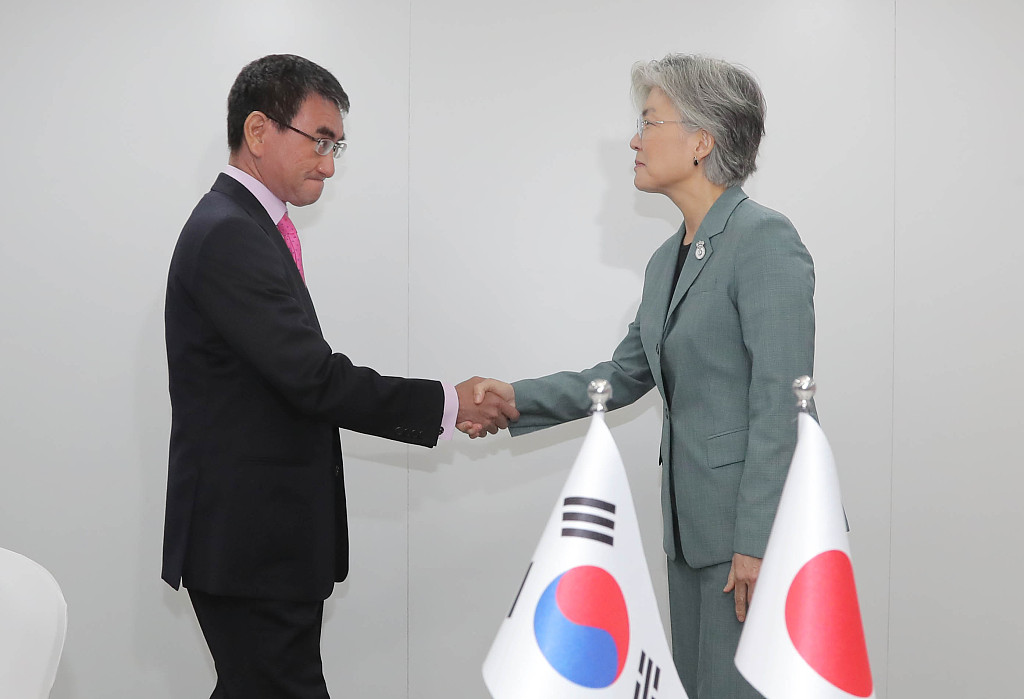
(File photo: VCG)
Japan's government voted on Friday to remove South Korea from a so-called white list of favoured export partners, defying warnings from Seoul that the move would have "grave consequences" for security ties between the US allies.
South Korea is now the first country ever to be dropped from Tokyo's list of nations granted minimal constraints on exports of products that could be diverted to military use.
"The government at a cabinet meeting today approved a revision to the export control law... South Korea, the only Asian nation on the list, will be removed," Japan's Trade Minister Hiroshige Seko told reporters.
The decision comes despite calls from Washington for the two US allies to set aside their differences and warnings from South Korea that it would review security cooperation with Japan if the de-listing went ahead.
Seoul said Friday it would respond "sternly" to the "unfair" decision.
The move, expected to take effect on August 28, means hundreds of products listed as sensitive will be subject to tighter export controls, though experts said the effect would be more symbolic than economic.
It "will only have a limited impact on the South Korean economy," said Hajime Yoshimoto, senior economist at Nomura Securities, in part because Japanese exporters can obtain special permission to ship to non-white-list countries with simplified procedures.
Many major Japanese exporters already have that special permission, according to the trade ministry.
Tokyo had already tightened the rules last month on exports of three products key to South Korea's chip and smartphone industries, raising fears for global supply in the sectors.
- 'Not an export embargo' -
"I'd like to make it clear that this is not an export embargo," Seko said Friday.
"We believe stripping South Korea of preferential treatment does not affect the global supply chain or have a negative impact on Japanese companies."
The measure is the latest blow to ties between South Korea and Japan, which have plunged to new lows over a long-running dispute on forced labour during World War II.
A string of South Korean court rulings ordering Japanese companies to compensate forced labour victims has infuriated Japan, which argues the issue was resolved when the two countries normalised ties.
Japanese officials say both the specific export restrictions imposed last month and the white list removal are not a "retaliation" though they have cited a "loss of trust" in ties with Seoul.
They say South Korea has repeatedly violated the rules governing sensitive exports and the moves are necessary for "national security."
The row has alarmed Washington and US Secretary of State Mike Pompeo is expected to hold trilateral talks with his Japanese and South Korean counterparts Taro Kono and Kang Kyung-wha on Friday.
- Relations at 'rock bottom' -
Kono and Kang talked Thursday, but the meeting appeared frosty, with little sign either side was moving toward a compromise.
Kono repeated Japan's position that it wants Seoul to "correct the situation" on the court rulings, calling it "very serious."
Kang meanwhile warned that "the security cooperation framework between South Korea and Japan may be affected" by Tokyo's removal of Seoul from the white list.
"I have made clear the grave consequences it would have on our bilateral relations," she told reporters.
Hidehiko Mukoyama, senior economist at Japan Research Institute, said the outlook was grim.
"This is in effect a de facto sanction against South Korea," he told AFP, saying it was clearly related to the wartime labour issue and not simply export security concerns.
He predicted retaliatory measures from South Korea, where public boycotts of Japanese goods and cancellations of exchanges with Japan have already taken hold.
"For South Korea, it must feel like a pinpoint assault to the heart," he said.
"The bilateral relation is at rock-bottom."


